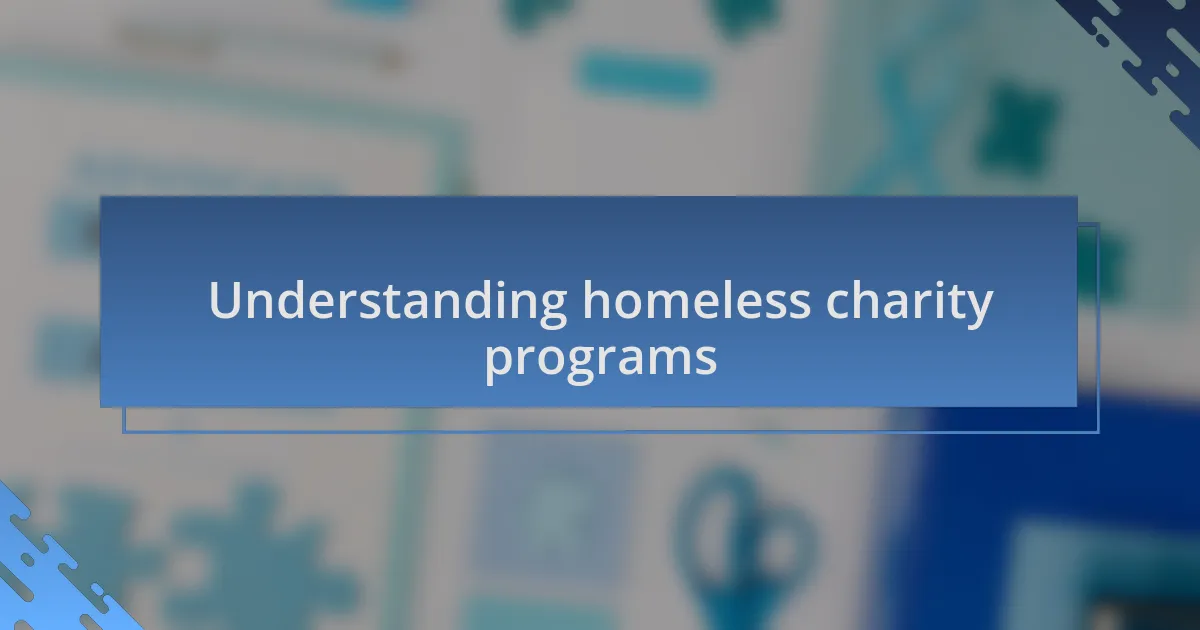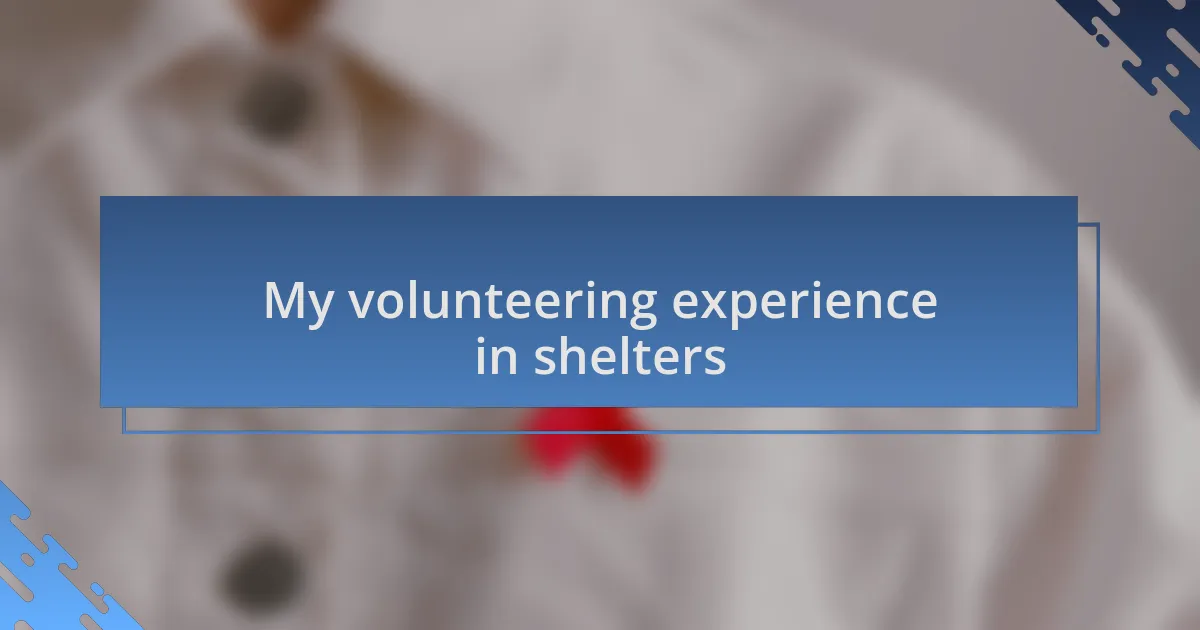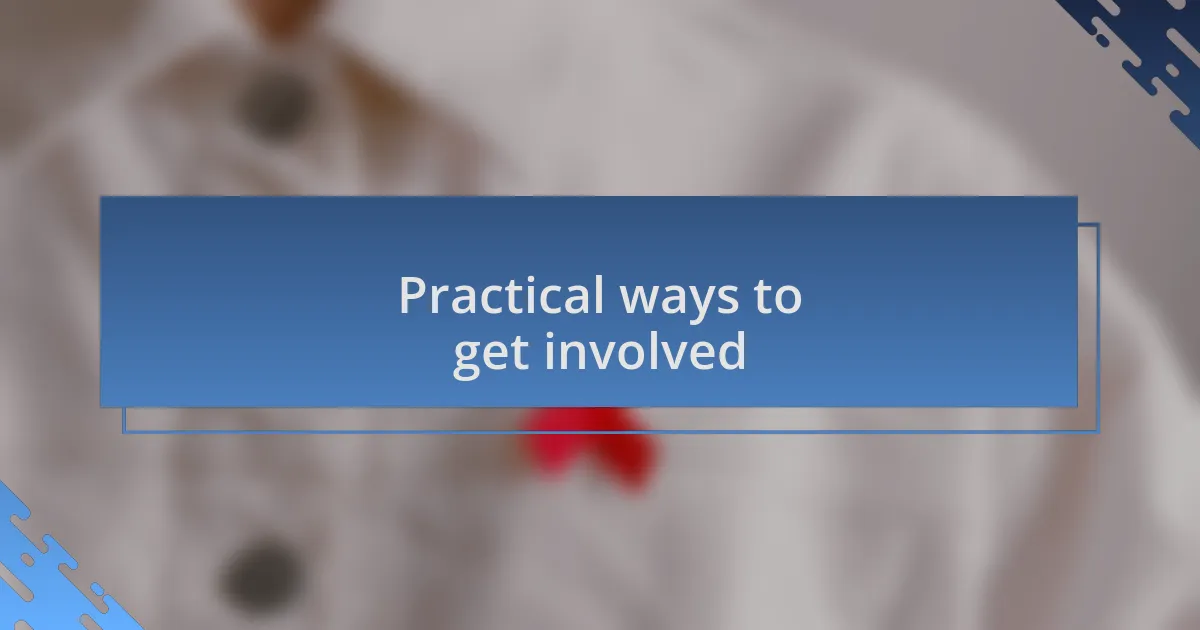Key takeaways:
- Homeless charity programs restore dignity and hope, focusing on holistic approaches that include job training and emotional support.
- Volunteering in shelters fosters human connection and empathy, significantly impacting both volunteers and residents.
- Support for shelters should include donations, emotional support, and community involvement to create a comprehensive safety net.
- Personal stories from shelter residents highlight resilience and aspiration, emphasizing the importance of support and understanding in overcoming adversity.

Understanding homeless charity programs
Homeless charity programs play a crucial role in addressing the immediate needs of those without shelter. I remember the first time I volunteered at a local shelter; the sheer warmth and gratitude I witnessed from those we served struck me deeply. It made me realize that these programs are not just about providing food and shelter; they are about restoring dignity and hope to individuals who often feel invisible in society.
One question that often comes to mind is, how do these programs measure their impact? While donations and volunteer efforts are essential, I believe the real success lies in the stories of transformation that unfold. For instance, I once met a man who had been on the streets for years but found his way back into stable housing through a program that not only offered him a bed but also provided job training. That connection demonstrated how holistic approaches can change lives dramatically.
Moreover, understanding the variety of programs available can guide our contributions more effectively. Some focus on short-term relief while others emphasize long-term solutions, like mental health support or addiction treatment. I recall discussing with a fellow volunteer how some individuals may initially need a safe place to sleep, yet what they genuinely crave is someone to believe in them. Recognizing these nuances can not only improve how we relate to those in need but also enhance the overall efficacy of charity efforts.

Importance of helping in shelters
Helping in shelters is vital because it directly addresses the urgent needs of vulnerable populations. During my time volunteering, I noticed how something as simple as a warm meal can not only fill a stomach but also spark connections and conversation. It left me wondering: what if our small acts of kindness could ripple out and foster a sense of community?
Moreover, shelters provide a safe haven where individuals can begin to rebuild their lives. I once served a woman who had experienced significant trauma; seeing her slowly regain her confidence through the support of shelter staff was incredibly moving. This experience led me to reflect on the profound strength found in supportive environments, and how crucial they are for healing.
The emotional impact of helping in shelters cannot be overstated. I remember chatting with a young man who expressed his fear of being forgotten. Listening to his story reminded me that each person has unique experiences and needs. It reinforced my belief that our role in shelters isn’t just about providing services, but also about fostering human connection and empathy to inspire lasting change.

Types of support for shelters
Supporting shelters encompasses a variety of crucial services that create a holistic safety net for those in need. For instance, I often saw how donations of clothing and hygiene products provided not just physical comfort but also helped restore dignity. Have you ever thought about how a fresh set of clothes changes a person’s outlook on life? It can be transformative.
Beyond basic necessities, emotional support plays an equally essential role in shelters. On one occasion, I facilitated a group discussion where sharing personal stories became a powerful method of healing. It dawned on me that while providing tangible resources is vital, we should never underestimate the strength derived from simply being present and listening. How often do we overlook the importance of a kind word or a listening ear?
Moreover, funding and volunteers are critical lifelines that keep shelters operational. I remember collaborating with local businesses to organize a fundraising event, which not only raised money but also strengthened community ties. It got me reflecting on how collective efforts can amplify the impact of our contributions. Isn’t it inspiring to think about what we can achieve when we join forces?

My volunteering experience in shelters
Volunteering in shelters has been one of the most enriching experiences of my life. I vividly remember my first day when I arrived, feeling nervous yet excited. As I handed out meals, I met a woman named Sarah, who shared her dreams of starting a small business. It struck me how we often think of shelter residents as just facing challenges, but they, too, have aspirations and stories just waiting to be told.
During my time at the shelter, I often engaged in one-on-one conversations. It amazed me how a simple cup of coffee could lead to heartfelt discussions. There was a moment when I sat with a young man who had lost everything, yet he spoke with such resilience. His hope was palpable, and I realized how sharing these moments not only uplifted him but also profoundly impacted me. Have you ever found strength in someone else’s story?
I also took part in planning activities for the residents. One evening, I organized a game night, which turned into an unexpected burst of laughter and camaraderie. It made me reflect on the importance of joy, even in dire situations. Seeing people come together and temporarily forget their struggles reminded me that a little fun can go a long way in rebuilding spirits. Don’t you think everyone deserves those moments of joy?

Stories that inspired my journey
One story that deeply impacted my journey involved a veteran named Tom. I was surprised to hear him share his experiences in the military, and despite the hardships he faced upon returning home, his sense of duty remained unwavering. Listening to him reflect on his service opened my eyes to the sacrifices many make for our country, prompting me to question how we can better support those who have given so much for us.
Another moment that stands out is when I met a single mother, Lisa, who was battling homelessness while trying to keep her children safe and happy. She carried an air of determination, recounting how she would read to her kids every night, even when they were living in a cramped shelter space. That simple act of nurturing amidst chaos struck a chord with me, underscoring how love and resilience can flourish even in the toughest circumstances. Have you ever witnessed such strength in someone facing adversity?
Finally, I can’t forget the transformation I witnessed during a personal growth workshop at the shelter. A quiet man, Dave, who usually kept to himself, suddenly opened up about his passion for music. By the end of the session, he performed an original song that carried his struggles and triumphs. It wasn’t just a performance; it became a collective celebration of hope and healing. This experience reminded me that sometimes sharing our gifts with the world can be the first step towards recovery. Isn’t it inspiring to think about the power of expression?

Practical ways to get involved
One impactful way to get involved is by volunteering your time at local shelters. I remember my first day volunteering; I was nervous but excited to make a difference. I found myself in the kitchen, preparing meals while chatting with the residents. The connections I built in those few hours were heartfelt and real, motivating me to return each week.
Another practical method is organizing donation drives for essentials like clothing, toiletries, or non-perishable food items. I once partnered with my neighborhood to gather supplies, and we exceeded our goal in just a few days. Seeing the community rally together for a common cause showed me how collective efforts can create significant change. Who knew that just asking friends to donate a few items could foster such hope?
You can also offer specialized skills, like job training or financial literacy workshops. I recall leading a session focused on resume building, and I was amazed at the enthusiasm from participants eager to learn. Sharing knowledge not only empowers individuals to regain their independence but also builds their confidence. Isn’t it rewarding to think that your expertise can ignite someone else’s path to stability?